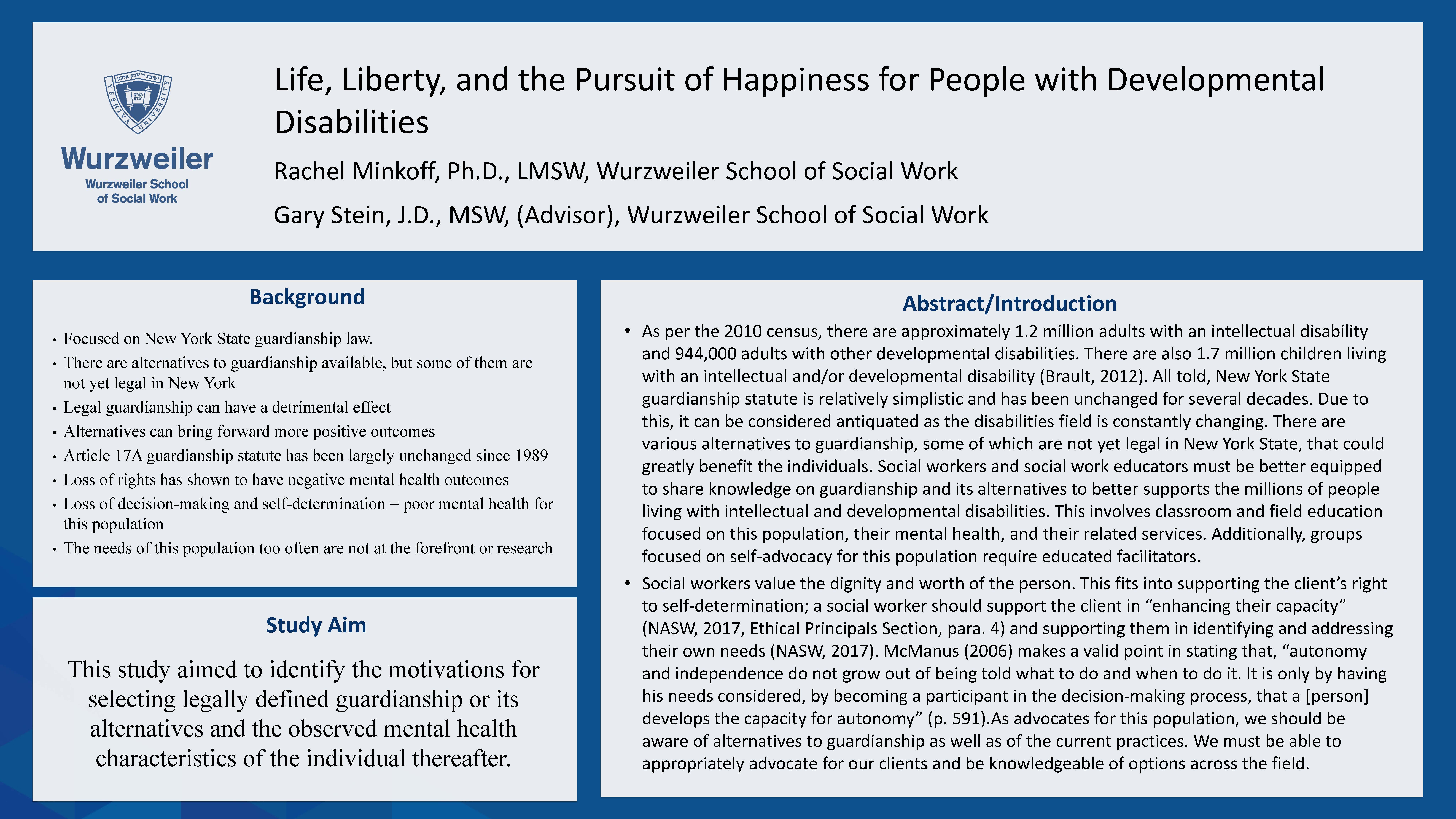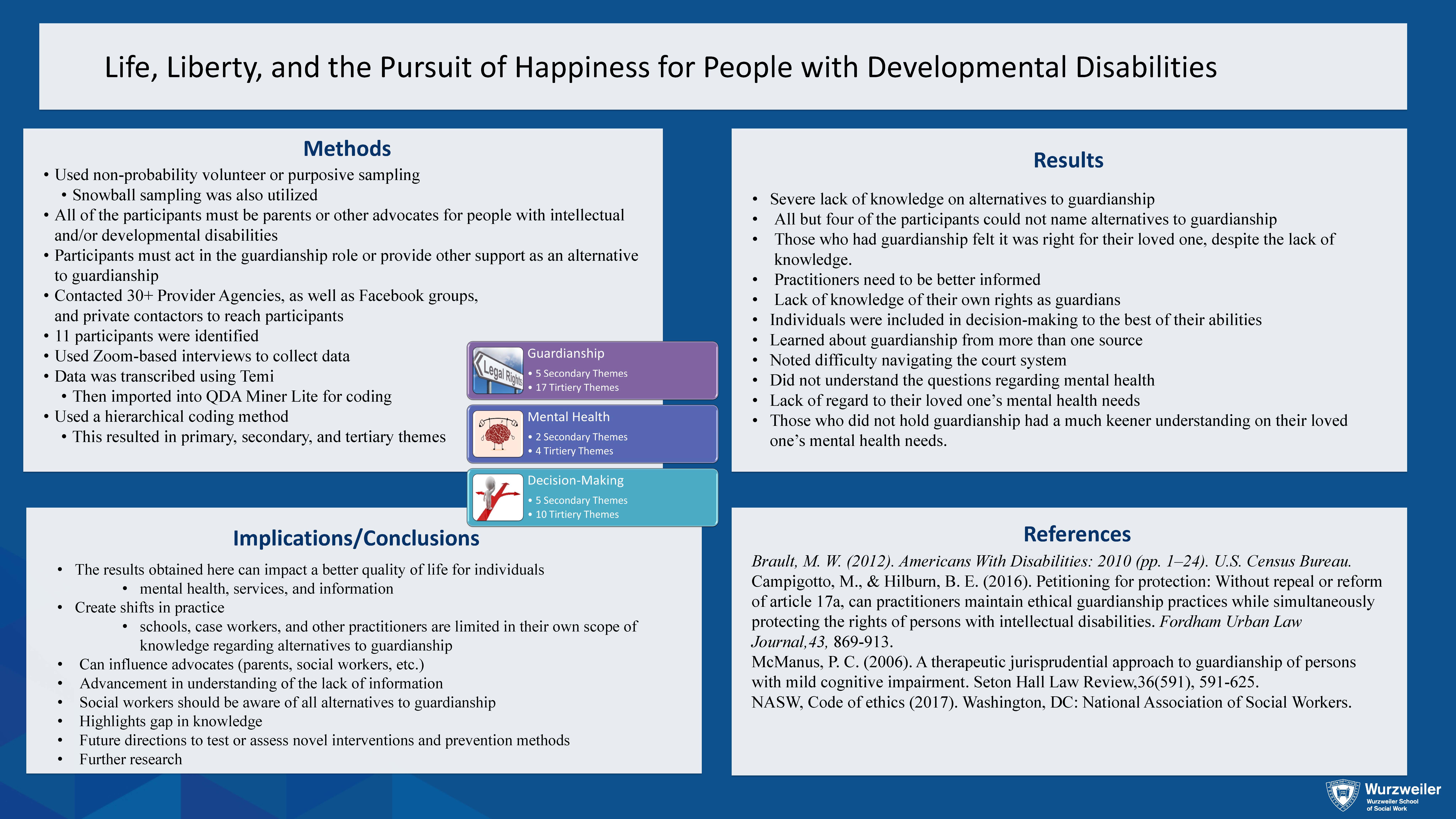Life, Liberty, and the Pursuit of Happiness for Individuals with Developmental Disabilities
Rachel Minkoff, Yeshiva University, New York, NY (USA)
Social workers and social work educators must be better equipped to share knowledge on guardianship and its alternatives to better support the millions of people living with intellectual and developmental disabilities. This involves classroom and field education focused on this population, their mental health, and their related services. This presentation will offer recommendations for social work education and group work facilitation to properly prepare social workers to serve and advocate for this population.
View PDF of Poster.
As per the 2010 census, there are approximately 1.2 million adults with an intellectual disability and 944,000 adults with other developmental disabilities. There are also 1.7 million children living with an intellectual and/or developmental disability (Brault, 2012). All told, New York State guardianship statute is relatively simplistic and has been unchanged for several decades. Due to this, it can be considered antiquated as the disabilities field is constantly changing. There are various alternatives to guardianship, some of which are not yet legal in New York State, that could greatly benefit the individuals. Social workers and social work educators must be better equipped to share knowledge on guardianship and its alternatives to better supports the millions of people living with intellectual and developmental disabilities. This involves classroom and field education focused on this population, their mental health, and their related services. Additionally, groups focused on self-advocacy for this population require educated facilitators.One of the ethical concerns in guardianship is the lack of autonomy and self-determination offered to the individual during the guardianship process and that continues even once they have a guardian. Guardianship is plenary, and once a guardian is placed, the individual no longer has any decision-making rights over any facet of their life. Social workers place a high value on self-determination; the NASW Code of Ethics (2017) states that we should work to promote a client’s right to self-determination; we should support the client in identifying their own goals and assist them in achieving them. That said, a social worker should also use professional judgment when limiting self-determination when a client is putting themselves or others in harm (NASW, 2017). Practitioners are potentially put in an ethical conundrum when the topic of guardianship comes up; they both want to advocate for the autonomy of the individual but ensure their safety as well (Campigotto & Hilburn, 2016). When this is the case, it is the practitioner’s duty to explore all support options available, SCPA17A and MHL 81 included, to determine what is in the best interests of the client. Social workers also value the dignity and worth of the person. This fits into supporting the client’s right to self-determination; a social worker should support the client in “enhancing their capacity” (NASW, 2017, Ethical Principals Section, para. 4) and supporting them in identifying and addressing their own needs (NASW, 2017). McManus (2006) makes a valid point in stating that, “autonomy and independence do not grow out of being told what to do and when to do it. It is only by having his needs considered, by becoming a participant in the decision-making process, that a [person] develops the capacity for autonomy” (p. 591).As advocates for this population, we should be aware of alternatives to guardianship as well as of the current practices. We must be able to appropriately advocate for our clients and be knowledgeable of options across the field.
- Brault, M. W. (2012). Americans With Disabilities: 2010 (pp. 1–24). U.S. Census Bureau.
- Campigotto, M., & Hilburn, B. E. (2016). Petitioning for protection: Without repeal or reform of article 17a, can practitioners maintain ethical guardianship practices while simultaneously protecting the rights of persons with intellectual disabilities. Fordham Urban Law Journal,43, 869-913.
- McManus, P. C. (2006). A therapeutic jurisprudential approach to guardianship of persons with mild cognitive impairment. Seton Hall Law Review,36(591), 591-625.
- NASW, Code of ethics (2017). Washington, DC: National Association of Social Workers.


